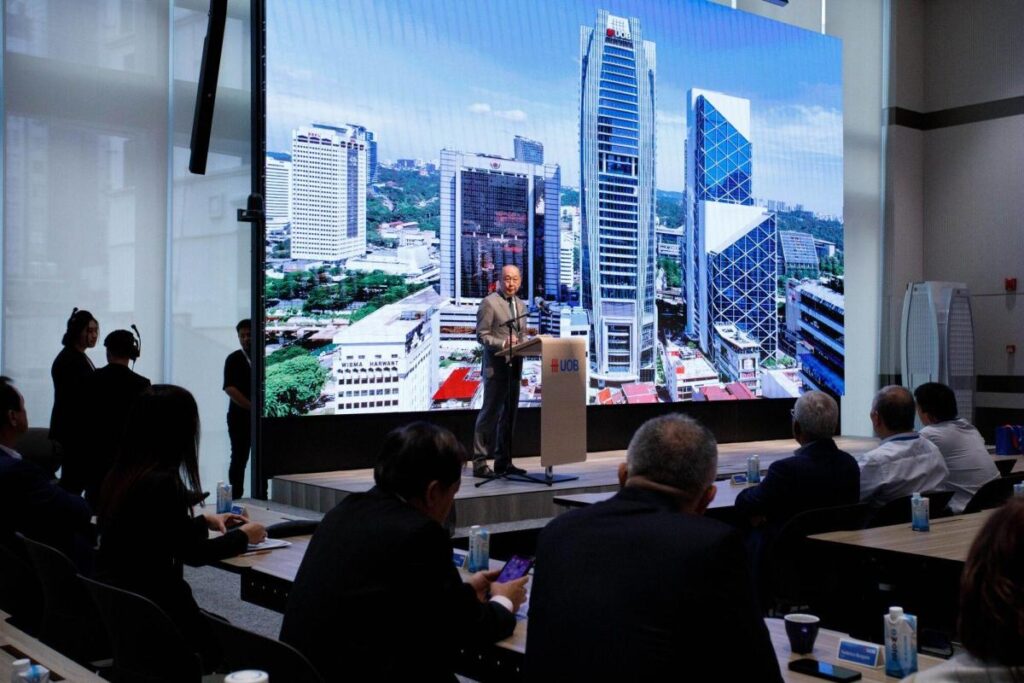United Overseas Bank (UOB), Singapore’s third-largest lender by assets, is aiming to dominate trade financing in Southeast Asia, capitalising on the region’s appeal as a beneficiary of a widening rift between the US and China.
The bank, which serves thousands of small and medium enterprises (SMEs) and corporate giants, wants to capture a bigger slice of the US$2 trillion trade flows in the region, according to Frederick Chin, head of group wholesale banking and markets.
“The bright spot will be in Asean for the next few years,” he said in an interview in Ho Chi Minh City last week, referring to the grouping of Southeast Asian nations. “We are already the number one trade bank in Asean, and I want to invest [our resources] to dominate this region.”
Do you have questions about the biggest topics and trends from around the world? Get the answers with SCMP Knowledge, our new platform of curated content with explainers, FAQs, analyses and infographics brought to you by our award-winning team.
As global manufacturers adopt “China plus one” strategies to mitigate the economic fallout from Washington-Beijing tensions, Southeast Asia has emerged as a key beneficiary of supply-chain upheavals. As a result, the region’s top economies attracted more foreign direct investment than China for the first time in a decade last year.
CEO Wee Ee Cheong speaks during a roadshow in Kuala Lumpur, on August 14, 2024. Photo: Bloomberg alt=CEO Wee Ee Cheong speaks during a roadshow in Kuala Lumpur, on August 14, 2024. Photo: Bloomberg>
UOB’s global wholesale banking offers a broad range of products including loans, trade services, cash management, and advisory services. The segment produced a record income of S$7.1 billion (US$5.5 billion) in 2023, according to the bank’s annual report to shareholders.
Despite its big presence in the region, UOB only commands 1 per cent of the market with around US$22 billion in trade assets in 2023, Chin said. That leaves a lot of room for his team to aim for a lion’s share of the cross-border trade banking market.
“Nobody dominates this space,” Chin added. “That is why I want to invest heavily. Five per cent by 2026 is my initial target.”
UOB, which started building capabilities in the region through cash management, financial supply chain management and payments capabilities a decade ago, is now reaping the benefits of its foresight. The rapid digital migration and manufacturing relocation, induced by the Covid-19 pandemic, have provided additional tailwinds for lenders.
An aerial picture of containers stacking up at Rizhao Port in eastern Shandong province. Photo: Xinhua alt=An aerial picture of containers stacking up at Rizhao Port in eastern Shandong province. Photo: Xinhua>
“As the pressure mounted, they started playing out a lot more in our favour,” Chin said. “We hope that can be sustained, and I believe it will be.”
Big regional corporate clients will remain the bank’s priority, while for multinational companies, UOB is looking to position itself as a regional service bank complementing global banking peers. SME suppliers will also be a focus to build a closed-loop business ecosystem, Chin added.
UOB is also keen to ride on sectoral trends in Southeast Asia. Malaysia’s semiconductor sector, Indonesia’s potential in mining and renewables, Thailand’s investments in higher-value sectors and automotive, and Vietnam’s strength in electronics and textiles, are key target areas, he added.
“Our strategy for future growth is all about connectivity,” Chin said. “We aim to do well to capture foreign direct investment. When companies build factories, we finance them. And from there, we can capture the goods and subsequent trade flows.”
This article originally appeared in the South China Morning Post (SCMP), the most authoritative voice reporting on China and Asia for more than a century. For more SCMP stories, please explore the SCMP app or visit the SCMP’s Facebook and Twitter pages. Copyright © 2024 South China Morning Post Publishers Ltd. All rights reserved.
Copyright (c) 2024. South China Morning Post Publishers Ltd. All rights reserved.
Read the full article here

